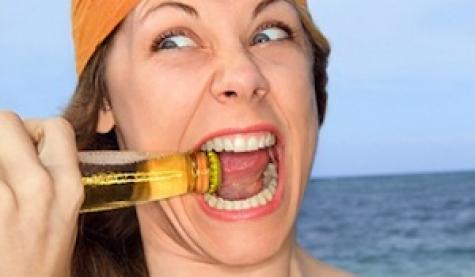If smoking, drinking, drug use, and oral sex are amongst the lifestyle choices of young people you know, you might want to let them know that their lifestyle choices could be having quite an impact. That’s the message of the Australian Dental Association (ADA) which has developed an Oral Survival Guide to help young people get to 30 years of age in good dental health.
A study conducted for the ADA and Oral-B by Galaxy Research shows that around three-quarters of 18-29 year olds do not brush their teeth after a night on the booze, even though 60% of them admit to feeling a ‘furry’ sensation on their teeth. According to Christopher Ho who is a spokesperson for Oral-B and a member of the ADA, that’s a tell-tale sign of plaque build-up.
“The research showed that young people are more likely to be concerned about how they feel generally, how much money they spent and what they might have said or done than to be concerned about their teeth,” he said.
In fact, teeth just don’t seem to register as a ‘health’ issue.
“Weight gain is the number one health issue followed by the impact on vital organs and the effect on skin, but many people – let alone young people – don’t see dental health as a big issue.”
Christopher Ho says it’s not just alcohol that’s having a detrimental effect on the teeth of young adults.
The ADA’s Oral Survival Guide contains a number of activities that could damage dental health in addition to alcohol and binge drinking, including:
- fizzy, sports and energy drinks – because they contain a large amount of sugar and tooth-eroding acid
- smoking – putting aside the risk of lung and oral cancer, smoking also tends to disguise the signs of other disease
- drugs – illegal, prescription and over-the-counter drugs can create imbalances inside the mouth that lead to dental problems
- oral sex – can facilitate the transmission of Human Papilloma Virus (HPV) which, in rare cases, can lead to oral cancer for both men and women. It is also the virus that causes cervical cancer in women.
Other misperceptions about teeth include that:
1. Not everyone’s teeth are suitable for whitening, especially with over-the-counter kits that can sometimes contain bleach
2. Teeth shouldn’t be used to open or tear things
3. Don’t munch on ice, eat popcorn kernels or other food that is extremely hard as it causes teeth to fracture, and
4. You can brush too hard and too often – the optimum is a gentle 2-minute brush morning and night with a soft toothbrush at least 30 minutes after you’ve eaten
The Oral Survival Guide contains further information about the damage potentially caused to teeth and tips for what young adults can do to give their teeth “a fighting chance of surviving past their 30th birthday.”








 Agree (0)
Agree (0) Disagree (
Disagree (











__small.png)










